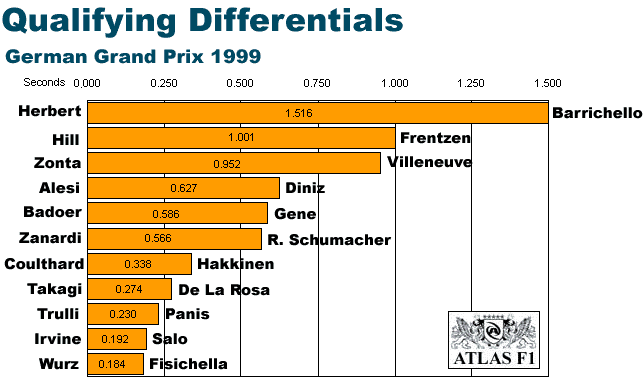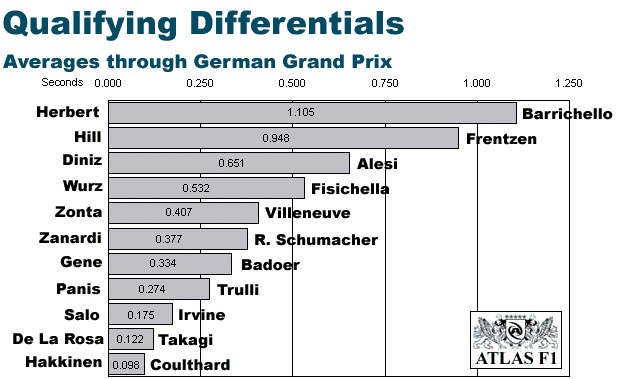|
Atlas F1 is going to keep an eye on the battle between team mates throughout the season by race and overall averages (again). The measurement is simple. We compare the intra-team difference in seconds on Saturday. Some may say compensation must be given in the favouritism between the number one and two seats within the team. We, on the other hand, do not grant that pardon. For better or worse, our analyses will be on the perfect world of egalitarian status in intra-team rivalry.
With ten qualifying sessions completed for 1999, the differentials are on a roll. Let's see which drivers deserve bragging rights.
Germany Notables
- Herbert. Can it get any worse for Johnny-boy? Once the Qualifying Differentials King of Atlas F1 (he ended the 1997 season being the leader, outqualifying his Sauber teammate Nicola Larini 17-0), Herbert is not only constantly outqualified by teammate Rubens Barrichello, but also outqualified with the largest margin on the grid, over and again. What's up, Johnny?
- Diniz. And once again Pedro Diniz outqualified Jean Alesi, for the second time in a row. Need we say more?...
- The Arrows Pair. OK, so now we know that Tora Takagi and Pedro de la Rosa read Atlas F1. After being utterly inseparable in qualifying, de la Rosa opened a gap over Tora. We then told the Japanese driver to wake up, and he responded by outqualifying his teammate by a big gap. And now it's Pedro's turn - 0.274sec only, but none the less; the overall average gap between the two is a mere 0.122sec in favour of Takagi. Let's see what happens in Hungary.
- Hakkinen. Mika Hakkinen outqualified his teammate in all but one occasion - the French Grand Prix, where the qualifying session proved to be no different than a lottery. But those 4+ seconds that Coulthard qualified ahead of Hakkinen, gave him the lead over his teammate in the overall average. Since then, Hakkinen has been eating out that lead, and now it stands on a mere 0.098sec. Expect Hakkinen to regain the lead after the next race.
The average gap between teammates in Germany was 0.588 of a second. This compared to 0.511sec in Austria; Britain's 0.463 seconds; France's 2.514sec; Canada's 0.588sec; Spain's 0.471sec; 0.671sec in Monaco; 0.601sec in San Marino; 0.446sec in Brazil; and 0.922sec in Australia. The overall average gap for the first ten rounds of 1999 stands on 0.457.
|


